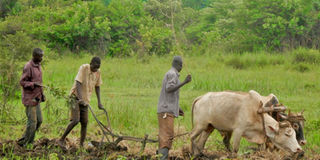Oyam women offer odd way to force men to dig

Men plough a garden in Adekokwok Sub-county, Lira District last year. Women in Abok Sub-county, Oyam District have resolved to deny lazy men sex to force them to work. PHOTO BY BILL OKETCH
What you need to know:
- In their study in Oyam, Lira, Dokolo and Alebtong districts, Global Health Network Uganda discovered that the only leisure activities for those formerly displaced by the Lord’s Resistance Army (LRA) conflict were drinking alcohol and sex.
- The researchers looked at the entire population of Lango Sub-region (2.1 million) people. They randomly sampled 411 respondents, which they believed was a representative of entire sub-region.
OYAM. A group of women in Abok Sub-county, Oyam District, have agreed to use sex as a bait to extract productive labour from lazy men in order to boost agricultural production.
Ms Helen Odur, the women’s farmer group chairperson in Abok Sub-county, Oyam District, said mid-April that lazy men would be denied sex to draw them back to the garden.
The women argue that because even the lazybones cannot do without sex, they would be forced to take up hoes and assist them in the farms and increase food production.
Mr Nelson Adea Akar, the Oyam District council chairperson, agrees that sex could be a critical tool in poverty eradication.
He says because of the lifestyle adopted by people in internally displaced people’s camps, many war-affected community cannot now do without sex or alcohol.
He urges women to stop offering free sex to lazy husbands who are unwilling to farm but only waste their energies on consuming alcohol.
“Somewhere in Apac District, women tried this trick [of denying lazy husbands sex] for only a week and it worked so well,” Mr Adea says.
But a social worker, Ms Joyce Ajok, says the proposed sex denial strategy would only escalate domestic violence.
“What a woman wants [in a relationship] is actually satisfaction and it doesn’t make sense for you to suggest that men should be denied sex,” she says.
Another resident, Mr Brian Yeko Ongora concurs that the move will cause more divorce.
“Someone men comes back home drunk and the wife rejects his advances and he ends up beating the woman or chasing her away,” he says.
Mr Bonny Okello, a resident of Otara Village, Aleka in Oyam District also warns that the proposal risks several negative consequences.
He says the strategy would only promote domestic violence between wives and husbands.
But Mr Denis Okech, a village chairman in Abella Parish, Aleka Sub-county in Oyam District, disagrees that the sex denial proposal has been brought in bad faith.
Strangely, a woman activist, Ms Stella Zalwedo backs the move.
“That’s better than denying men food,” she says, adding that no man will fights openly when denied sex for fear of the shame that comes with it.
Interestingly, a January 2018 study on beer consumer behaviour by non-profit organisation Global Health Network Uganda, reveals that many people in Oyam cannot do without sex or alcohol.
The study on consumer preferences towards Nile Breweries and Uganda Breweries products was conducted to enhance evidence-based programming, policy and business in Lango Sub-region through research and innovation.
The study sampled 411 respondents from the four districts, with men (34 per cent) found drinking more alcohol on a daily basis than women (23. 5 per cent).
In their study in Oyam, Lira, Dokolo and Alebtong districts, Global Health Network Uganda discovered that the only leisure activities for those formerly displaced by the Lord’s Resistance Army (LRA) conflict were drinking alcohol and sex. LRA burdened districts in Lango included Oyam, Otuke, Lira and Alebtong.
In another separate study by Global Health Network in January 2018 that queried whether there is any relationship between income, health, wellbeing and happiness, the respondents in Oyam appeared wealthy.
Highest percentage of respondents found to be drinking daily were in Oyam (26.5 per cent), with Lira (24.6 per cent), Dokolo (24.6 per cent) and Alebtong at 24.3 per cent.
But the study discovered respondents in Alebtong were happiest compared to their counterparts in Dokolo, Lira and Oyam.
However, based on their income levels, they were found poorer than their counterparts in Oyam, with a population of 388,011 people.
Respondents in Oyam earned on average Shs100,000 to Shs500,000 annually, but their counterparts in Alebtong earned on average Shs10,000 to Shs100,000 within the same period.
Leisure activity
In their study in Oyam, Lira, Dokolo and Alebtong districts, Global Health Network Uganda discovered that the only leisure activities for those formerly displaced by the Lord’s Resistance Army (LRA) conflict were drinking alcohol and sex.
The researchers looked at the entire population of Lango Sub-region (2.1 million) people. They randomly sampled 411 respondents, which they believed was a representative of entire sub-region.
Both open-ended and closed questionnaires were administered to the 411 respondents in Oyam, Lira, Alebtong and Dokolo districts.
The study involved used of random sampling.




